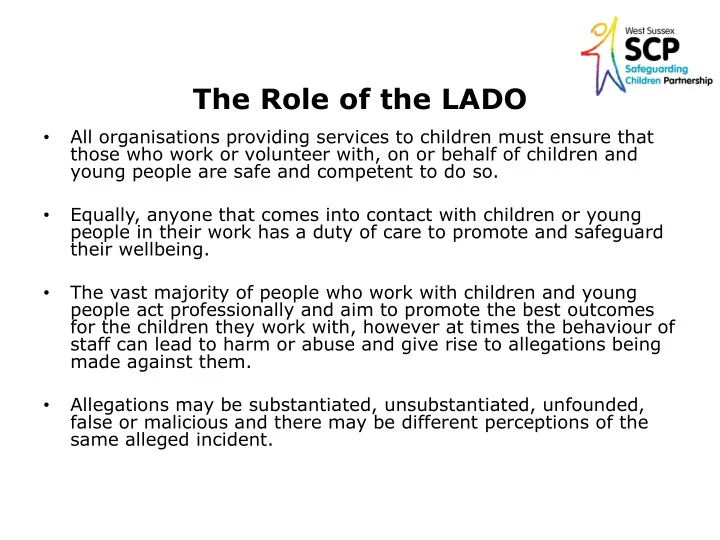

The Role of the LADO All organisations providing services to children must ensure that • those who work or volunteer with, on or behalf of children and young people are safe and competent to do so. Equally, anyone that comes into contact with children or young • people in their work has a duty of care to promote and safeguard their wellbeing. The vast majority of people who work with children and young • people act professionally and aim to promote the best outcomes for the children they work with, however at times the behaviour of staff can lead to harm or abuse and give rise to allegations being made against them. Allegations may be substantiated, unsubstantiated, unfounded, • false or malicious and there may be different perceptions of the same alleged incident.
Who is responsible for the allegations against the children’s workforce process in West Sussex? The Local Authority Designated Officer (LADO) has overall • responsibility for the management of allegations of abuse by adults who work with or volunteer with children. The LADO provides advice , in the form of consultation • and specific guidance, liaising with Children’s Services, the Police and other regulatory bodies such as OFSTED and the Department for Education as needed in order to ensure a consistently fair and thorough process for both adult and child The LADO manages individual cases and monitors the • progress of cases for timeliness, thoroughness and fairness.
When is it necessary to contact the LADO? The Pan Sussex Child Protection and Safeguarding Procedures provides • guidance on managing cases of allegations that may indicate that a staff member may not be suitable to work with children in their current position, or in any other capacity. A ‘staff member’ is a person over the age of 16 years whose work brings • them into contact with children in their setting. It applies to all adults whether paid or working in a voluntary capacity (including agency workers) on or off site. The procedures should be used in ALL cases in which it is alleged that a • staff member has; Behaved in a way that has harmed a child or may have harmed a child; • Possibly committed a criminal offence against or related to a child; • Behaved towards a child or children in a way that indicates he/she would • pose a risk of harm to children. Information may also come to light about a staff members conduct • outside of the workplace which may indicate a breach of professional conduct or may raise concerns about their suitability to work within the children’s workforce.
When is it necessary to contact the LADO? It is important that all allegations of abuse and breaches of professional • conduct are taken seriously and considered with an open and inquiring mind . The employer should contact the LADO within one day of the • incident happening or the allegation being made. The employer must NOT commence an internal investigation before consulting with the LADO but should gather basic details such as was the employee actually working that day, did they potentially come into contact with the child(ren) and have any other potential witnesses come forward to corroborate or discount the alleged incident ? The LADO will consider the information and whether it meets the threshold • for further consultation with Children’s Services and the Police
What happens when I contact the LADO? Initially, you will be asked for some basic information to • determine the next steps and whether it is felt that the threshold is met for the allegations management process. The LADO will consider the information and whether it • meets the threshold for further consultation with Children’s Services and the Police. It remains the responsibility of the Police and Children’s • Services to investigate allegations of abuse and conduct further assessments before the employer starts to investigate an allegation . Any such investigation without the guidance and advice of the LADO could potentially jeopardise a subsequent criminal investigation. You may be asked to complete a referral form after your • initial consultation with the LADO and this should be returned electronically as soon as possible.
What happens when I contact the LADO? Whilst each setting should have a designated member of • staff or child protection lead, ALL staff have a responsibility to report if they believe a member of staff is harming or is behaving in a manner which may potentially cause harm. The LADO will provide guidance on what to do immediately • and in the longer term, depending on the nature of the allegation and involvement of other agencies. If directed by the LADO to internally investigate an • allegation, actions should be conducted in a way that recognises the vulnerability of staff and seeks to protect them as far as possible from mistaken or false allegations, with the support of the settings’ own Human Resources team, whilst recognising that the need to assess and manage the risk they may pose to a specific child or children needs to remain of paramount importance.
Contact Details for the LADO The LADO for West Sussex is Jenny Coker The LADO department contact number is 0333 222 6450 LADO@WestSussex.gov.uk
Recommend
More recommend